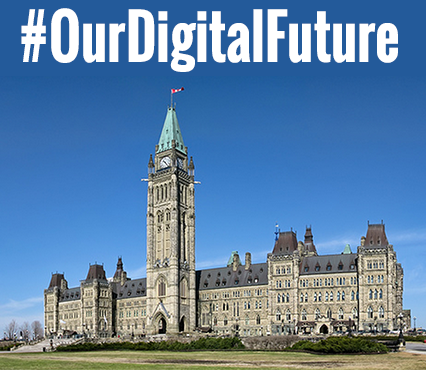Like this article? Chip in to keep stories like these coming.
![]()
It may be the dog days of August, but here at OpenMedia our small team is gearing up for the most important election campaign that Canadian Internet users have ever faced.
Whether you’re concerned about Bill C-51, Internet censorship or affordable wireless and broadband bills, it’s clear that the stakes could not be higher. Here are five ways this election will shape our digital future for a generation to come:
1. Bill C-51
Nearly 300,000 Canadians have spoken out against the government’s reckless spying Bill C-51. The NDP, the Greens and smaller parties like the Libertarians are listening and have promised to completely repeal Bill C-51 if elected. The Liberals, who voted for Bill C-51, are now feeling the heat and promising at least modest reforms, with Trudeau admitting he was “naive” to have voted for it. Meanwhile the Conservatives have doubled-down on their support for the bill, meaning this election will decide whether this highly unpopular legislation lives or dies.
2. Internet censorship and the Trans-Pacific Partnership (TPP)
We know from leaked documents that the TPP would force Canada to massively overhaul its copyright rules, locking Canadians into an Internet that’s more expensive, censored and policed than ever before. That said, final ratification of the TPP will need to wait until after the election, so it’s crucial we elect politicians who promise to stand up for sensible copyright rules that safeguard free expression online.
3. Our cell phone bills are too damn high
Canadians have long paid some of the highest prices in the industrialized world for cell phone service — a problem that the government, from Stephen Harper on down, promised to fix. The end-of-term results are now in and, despite some positive steps, it simply wasn’t enough. In the end, the government gets a failing grade. The government’s official 2015 Wall Report confirmed that cell phone bills are still rising at over three times the rate of inflation. Most Canadians don’t need an official report to tell them their bills are too high, but they do need a government willing to implement our crowdsourced action plan to lower prices.
4. Government surveillance is out-of-control
At the last election, few Canadians had even heard of the CSE, Canada’s spy agency equivalent of the U.S. NSA. Since then, Canadians have watched aghast as revelations from Edward Snowden exposed widespread CSE spying on our private lives, including our Internet downloads, our emails to MPs and even on free airport wi-fi. With polls revealing that over 77 per cent of Canadians are concerned, voters will be looking for a government pledged to end mass surveillance by implementing these crowdsourced recommendations.
5. Canadians are stuck with some of the slowest Internet around
Our slow, expensive and unreliable Internet has been holding Canada’s economy back for years, and this government’s painfully unambitious Digital Canada 150 strategy means Canada will fall further behind. Investments we make now will have a huge impact on our economy in the future. Isn’t it time for a government that takes action to ensure that all Canadians have access to speedy, affordable, world-class Internet?
The path forward:
For years, OpenMedia has worked to defend digital rights, mobilizing hundreds of thousands of people to take part in crowdsourced policy consultations that have developed positive alternatives to safeguard our privacy, bring down cell phone bills, strengthen Internet openness and protect free expression online.
The positive crowdsourced alternative exists — now all it takes is politicians willing to listen. That’s why next week we’ll be launching a new Vote Pledge tool: the more Canadians who pledge to cast a pro-Internet vote, the more likely it is that we’ll force the politicians to listen to Canadians and promise to implement what they want.
Of course, as a post-partisan organization, we won’t be recommending a vote for any particular political party in this election. But we will certainly be informing our community of over 500,000 passionate Internet users about where each of the parties stand on the issues that matter most.
There’s a lot at stake here. If Canada continues on the path the current government has set it on, then harmful policies on surveillance, Internet censorship and Big Telecom dominance could be locked in place for a generation and hold back our digital economy. Canadians deserve better.
We’ll shortly be unveiling more about our election plans, but first we want to hear from you. Use the comments section on our website to tell us what you think politicians should be focusing on when it comes to securing a fair digital future for all of us.
In the meantime, don’t forget to follow us on our lively Facebook and Twitter feeds to stay in the loop on this campaign.
Like this article? Chip in to keep stories like these coming.
![]()




